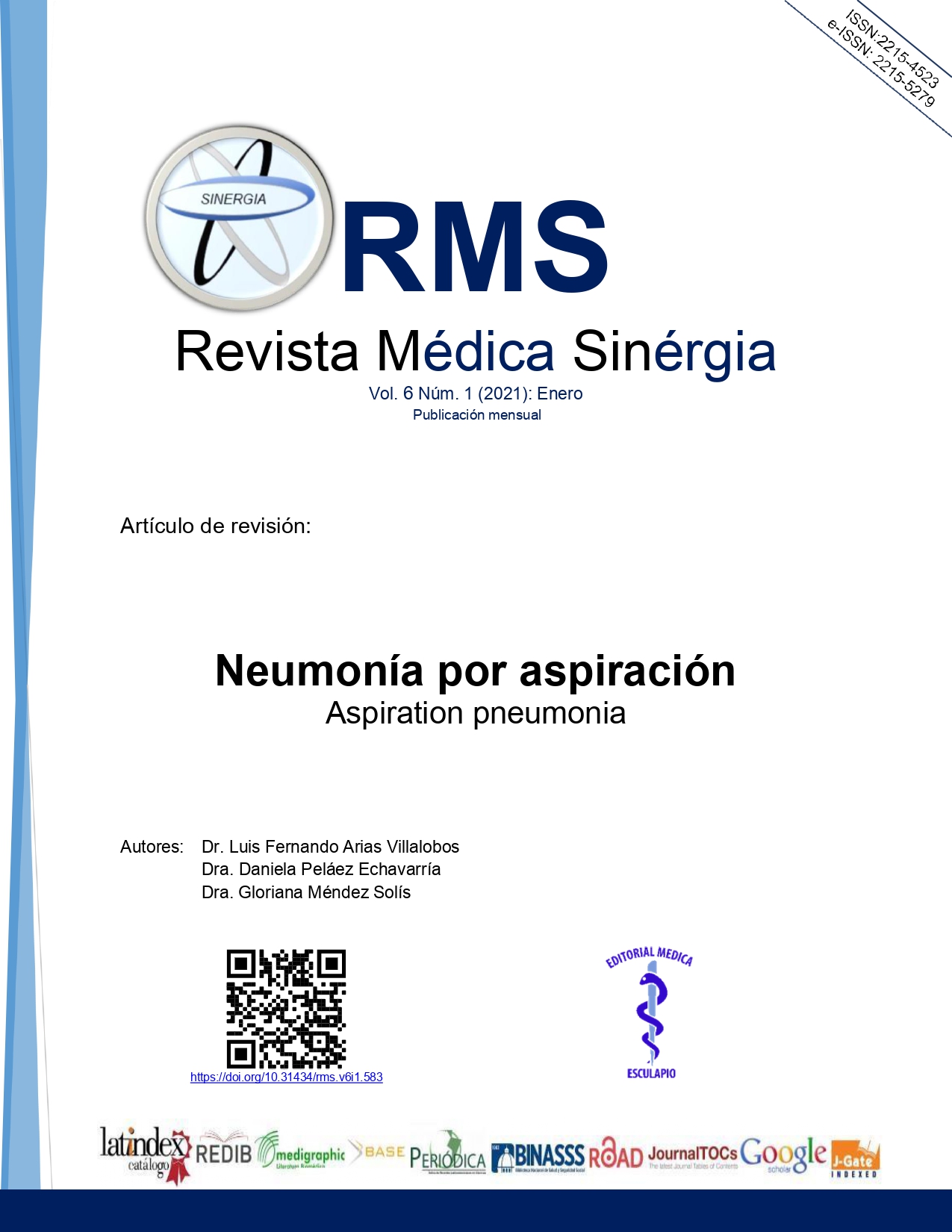Abstract
Aspiration pneumonia refers to the pulmonary consequences caused by the abnormal entry of fluid, exogenous substances in particles or endogenous secretions in the lower respiratory tract, and microaspiration is an essential characteristic. It accounts for almost one sixth of the community-acquired pneumonia cases that warrant hospitalization. The most common and best-studied clinical syndromes are chemical pneumonitis, bacterial infection, and airway obstruction. Symptoms encompass a wide range from the absence of symptoms to respiratory failure, and there is no universal definition, a risk rating system or a set of specific diagnostic criteria. The diagnosis is based on a clinical history with clinical characteristics of typical or atypical pneumonia, supported by compatible findings on chest radiography or other imaging studies. Treatment is based on patient support measures, aspiration of gastric content and airway remains, it can be supplemented with antibiotics in case of coinciding with bacterial symptoms, always identifying the origin of the infection, whether community or nosocomial, and guided by results of microbiological samples. There are some measures that have been used to help prevent aspiration pneumonia.
Keywords
References
Metlay JP, Waterer GW, Long AC, Anzueto A, Brozek J, Crothers K, et al. Diagnosis and Treatment of Adults with Community-acquired Pneumonia. An Official Clinical Practice Guideline of the American Thoracic Society and Infectious Diseases Society of America. Am J Respir Crit Care Med [Internet]. 2019 Oct 1 [citado 20 de agosto de 2020];200(7):e45-67.https://doi.org/10.1164/rccm.201908-1581ST
Bartlett J. G. Aspiration pneumonia in adults [Internet]. Uptodate. 2020. [citado 20 de agosto de 2020]. Disponible en: https://www.uptodate.com/contents/aspiration pneumonia-in adults?search=Aspiration%20pneumonia&source=search_result&selectedTitle=1~150&usage_type=default&display_rank=1
Makhnevich A. Aspiration Pneumonia in Older Adults. J Hosp Med [Internet]. 2019 [citado 20 de agosto de 202014(7):429.
https://doi.org/10.12788/jhm.3154
Mandell LA, Niederman MS. Aspiration Pneumonia. New England Journal of Medicine [Internet]. 14 de febrero de 2019 [citado 24 de agosto de 2020];380(7):651-63.https://doi.org/10.1056/NEJMra1714562
Lindenauer PK, Strait KM, Grady JN, Ngo CK, Parisi ML, Metersky M, et al. Variation in the Diagnosis of Aspiration Pneumonia and Association with Hospital Pneumonia Outcomes. Annals ATS [Internet]. 3 de enero de 2018 [citado 24 de agosto de 2020];15(5):562-9.
https://doi.org/10.1513/AnnalsATS.201709-728OC
Komiya K, Rubin BK, Kadota J, Mukae H, Akaba T, Moro H, et al. Prognostic implications of aspiration pneumonia in patients with community acquired pneumonia: A systematic review with meta-analysis. Scientific Reports [Internet]. 7 de diciembre de 2016 [citado 3 de septiembre de 2020];6(1):1-9.
https://doi.org/10.1038/srep38097
Rodriguez AE, Restrepo MI. New perspectives in aspiration community acquired Pneumonia. Expert Review of Clinical Pharmacology [Internet]. 2019 Oct 3 citado 3 de septiembre de 2020];12(10):991-1002. https://doi.org/10.1080/17512433.2019.1663730
Dickson RP, Erb-Downward JR, Martinez FJ, Huffnagle GB. The Microbiome and the Respiratory Tract. Annu Rev Physiol [Internet]. 10 de febrero de 2016 [citado 4 de septiembre de 2020];78(1):481-504. https://doi.org/10.1146/annurev-physiol-021115-105238
Neill S, Dean N. Aspiration pneumonia and pneumonitis: a spectrum of infectious/noninfectious diseases affecting the lung. Current Opinion in Infectious Diseases [Internet]. abril de 2019 [citado 4 de septiembre de 2020];32(2):152-157.
https://doi.org/10.1097/QCO.0000000000000524
DiBardino DM, Wunderink RG. Aspiration pneumonia: A review of modern trends. Journal of Critical Care [Internet]. 2015 Feb 1 [citado 4 de septiembre de 2020];30(1):40-8. https://doi.org/10.1016/j.jcrc.2014.07.011
Drossman DA. Functional Gastrointestinal Disorders: History, Pathophysiology, Clinical Features, and Rome IV. Gastroenterology [Internet]. 2016 May 1 [citado 5 de septiembre de 2020];150(6):1262-1279.e2. https://doi.org/10.1053/j.gastro.2016.02.032
Lee AS, Ryu JH. Aspiration Pneumonia and Related Syndromes. Mayo Clinic Proceedings [Internet]. 2018 Jun 1 [citado 5 de septiembre de 2020];93(6):752-62. https://doi.org/10.1016/j.mayocp.2018.03.011
Claessens Y-E, Debray M-P, Tubach F, Brun A-L, Rammaert B, Hausfater P, et al. Early Chest Computed Tomography Scan to Assist Diagnosis and Guide Treatment Decision for Suspected Community-acquired Pneumonia. Am J Respir Crit Care Med [Internet]. 13 de julio de 2015 [citado 5 de septiembre de 2020];192(8):974-82. https://doi.org/10.1164/rccm.201501-0017OC
Ajitsaria P, Eissa SZ, Kerridge RK. Risk Assessment. Curr Anesthesiol Rep [Internet]. 2018 [citado 5 de septiembre de 2020];8(1):1-8. https://doi.org/10.1007/s40140-018-0246-9
Russotto V, Sabaté S, Canet J, Network for the P groupof the ES of A (ESA) CT. Development of a prediction model for postoperative pneumonia: A multicentre prospective observational study. European Journal of Anaesthesiology | EJA [Internet]. febrero de 2019 [citado 5 de septiembre de 2020];36(2):93-104. https://doi.org/10.1097/EJA.0000000000000921
Bowerman TJ, Zhang J, Waite LM. Antibacterial treatment of aspiration pneumonia in older people: a systematic review. Clin Interv Aging [Internet]. 30 de octubre de 2018 [citado 7 de septiembre de 2020];13:2201-13. https://doi.org/10.2147/CIA.S183344
Hollaar V, van der Maarel-Wierink C, van der Putten G-J, van der Sanden W, de Swart B, de Baat C. Defining characteristics and risk indicators for diagnosing nursing home-acquired pneumonia and aspiration pneumonia in nursing home residents, using the electronically-modified Delphi Method. BMC Geriatrics [Internet]. 7 de marzo de 2016 [citado 7 de septiembre de 2020];16(1):60. https://doi.org/10.1186/s12877-016-0231-4
Dragan V, Wei Y, Elligsen M, Kiss A, Walker SAN, Leis JA. Prophylactic Antimicrobial Therapy for Acute Aspiration Pneumonitis. Clin Infect Dis [Internet]. 1 de agosto de 2018 [citado 8 de septiembre de 2020];67(4):513-8. https://doi.org/10.1093/cid/ciy120
Lambert AA, Lam JO, Paik JJ, Ugarte-Gil C, Drummond MB, Crowell TA. Risk of Community-Acquired Pneumonia with Outpatient Proton-Pump Inhibitor Therapy: A Systematic Review and Meta-Analysis. PLoS One [Internet]. 2015 Jun 4 [citado 8 de septiembre de 2020];10(6). https://doi.org/10.1371/journal.pone.0128004

This work is licensed under a Creative Commons Attribution-NonCommercial 4.0 International License.
Copyright (c) 2021 Array


